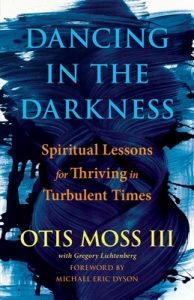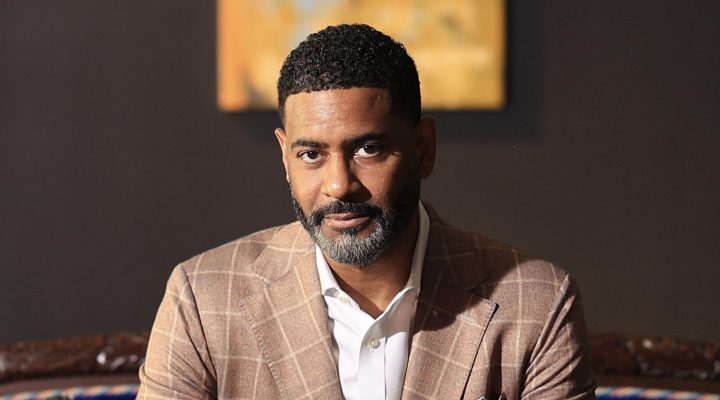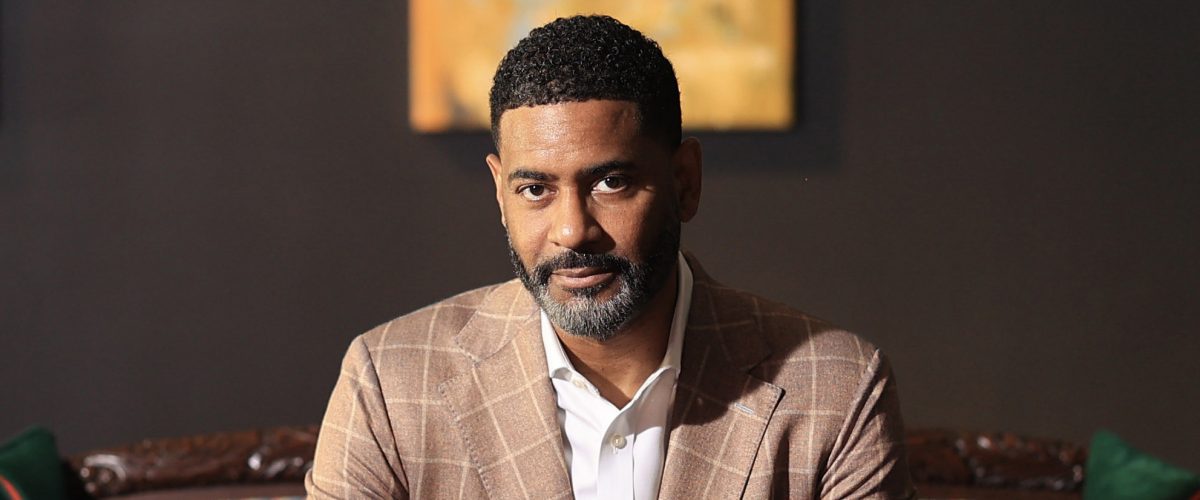When one of his parishioners ran for U.S. president, Otis Moss III and his church received threats of violence. Those threats of “We’re going to kill you” still haunted him years later when he heard a noise in his home in the middle of the night.
He grabbed a baseball bat. But when he opened the door to his daughter’s room, he did not find an intruder. He saw his daughter dancing, practicing for a ballet recital.
That became the inspiration for his latest book, Dancing in the Darkness.
 The pastor to then Senator and later President Barack Obama drew upon the teachings of Martin Luther King, Howard Thurman, Scripture, Southern wisdom, Black culture and personal experiences to create a book about combining justice and love.
The pastor to then Senator and later President Barack Obama drew upon the teachings of Martin Luther King, Howard Thurman, Scripture, Southern wisdom, Black culture and personal experiences to create a book about combining justice and love.
Moss not only serves as pastor of Trinity United Church of Christ in Chicago but also as professor of homiletics at Mercer University’s McAfee School of Theology in Atlanta. He’s also a speaker, writer and content creator.
That’s all possible because he has a “five-star team” at home and church, he said. “I’m so grateful for my wife, who is truly the chair of the board of directors in the Moss household. Having a team in place is essential. We have a five-star team at Trinity United Church of Christ. So, they are able to handle some of the work and administrative aspects that allow me to venture into all these different spheres of ministry.”
The new book is based on his experience as a pastor and community leader. He examines what he has seen in the eyes of the people he ministers to, how they are dealing with the stressors of life.
“I witnessed people, not only in the congregation, but across the community, really across the nation,” he said. “People were attempting to scratch this itch with scrolling and chasing materialism, along with other lesser-value things. They were trying to scratch this itch with physical and material tools, and it became very evident that people were still empty. But they’re yearning for something that is bigger and greater and wider than what the world can offer. What are the values that we need to flourish as human beings? What are the values that are central to the message of Jesus Christ?”
In difficult times, Moss wants to help people look to Jesus for fulfillment.
In difficult times, Moss wants to help people look to Jesus for fulfillment.
“I started out in youth ministry and learned the aspect of breaking it down — how do you take what are challenging, big concepts and make them simple? Essentially, what Jesus did over and over again is that while scribes and Pharisees and religious scholars were giving theological arguments, he told a story.
“That motif has always been the framework I attempt to utilize when engaging with people and communicating the gospel,” he added. “When talking about movies and comic books, I’m utilizing those concepts Jesus used by telling a story, breaking it down and making it engaging so people can understand.”
Moss is known in Chicago and beyond as someone who champions the Social Gospel.
His father, Otis Moss Jr., was a pastor who worked with Martin Luther King Jr. in the Southern Christian Leadership Conference and served Olivet Institutional Baptist Church in Cleveland, Ohio.
While a master of divinity student at Yale University, the younger Moss was deeply influenced by the writing of James Cone. Then he was called as pastor of Tabernacle Baptist Church in Augusta, Ga., a church founded in 1885 and a local base of operation for the Civil Rights movement.
“Love and justice married together produce liberation and transformation,” Moss said. “We live in a world that views justice as retribution, and we have difficulty seeing justice as restoration and redemption.
“Even though that’s central to the gospel, we still have difficulty dealing with that, and when people hear the word ‘justice’ they are thinking from their own insecurity of retribution. They are framing the idea of justice, of shifting the pillars of power, when in actuality we are talking about restoration in redemption.
“How do we fully flourish as human beings? That’s the justice Jesus is talking about.”
“How do we fully flourish as human beings? That’s the justice Jesus is talking about.”
Moss does not want merely to talk and write about justice but to embody it in his own ministry as pastor of an influential church on the Southside of Chicago. That is his first vocational calling, yet it allows him to write and create out of the overflow of his calling.
He acknowledges “the loneliness of not only the pastorate but the loneliness of being in a position of servant leadership beyond the small garden of your community.”
Moss came to Trinity in 2006 initially as assistant pastor with Jeremiah Wright. Moss assumed responsibility for regular preaching in 2008 — the year Obama first ran for president — and was installed as senior pastor in May 2009.
“We were thrust on the national stage,” Moss said. “We became a church that was deeply committed to the transformation of the Southside of Chicago. And we are Chicagoans. We love our city and believe in the possibilities of this city. And with all the narratives that we hear nationally from people talking about Chicago, I’m always like, ‘Come and visit the Southside of Chicago and we’ll show you a Southside that you have never seen on any major network that will blow your mind.”
Related article:
McAfee names prominent pastor to preaching faculty


